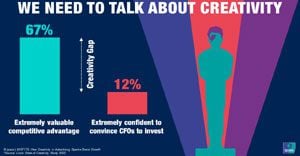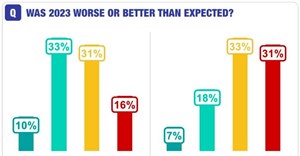
Global perceptions of gender equality - Poll
Women though are more positive when it comes to their own lives – six in ten on average agree they have “full equality with men in their country and the freedom to reach their full dreams and aspirations” – although this still means that in several countries many women disagree.
The survey, among online adults aged under 65 in Argentina, Australia, Belgium, Brazil, Canada, China, France, Britain, Germany, Hungary, India, Italy, Japan, Mexico, Peru, Poland, Russia, Serbia, South Africa, South Korea, Spain, Sweden, Turkey and the United States (including both men and women) also finds a majority of both women and men on average define themselves as feminist (58% on average), even though a quarter (24%) say they are scared to speak up for equal rights – especially in India.
Around one in five on average say they believe women are inferior to men or that women should just stay at home, although it is higher in India and Russia. Key findings – including the main differences between countries and between men and women, are outlined below.
Because the survey is conducted online, this reflects the opinion of those South Africans who have online access and not that of the total adult population.
Does equality exist?
- Nine in ten around the world (88% on average) say they believe in equal opportunities for men and women, and the figure is high among both men and women (86% and 89% respectively). A clear majority in each of the 24 countries believes in this (lowest in Japan at 71%).
- In South Africa, a huge majority (91%) believe in equal opportunities.
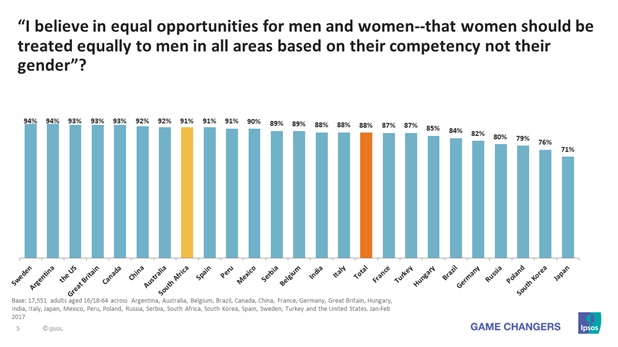
- However, 72% on average say that inequality currently exists in terms of social, political, and/or economic rights, especially women (by 76% to 68% of men). South Africa is close to the average at 77%. Again, a majority in every country believes inequality exists, except for Russia at only 42%.
- Women are more positive personally though. On average, 60% agree that they have full equality with men in their country and the freedom to achieve their full dreams and aspirations – but 40% disagree. However, in seven of the 24 countries most women disagree, especially in Spain, Japan, South Korea and Turkey. 82% of South African women and 73% of SA men agree that women have equality with men in our country.
Gender roles
- On average, one in five believes that women are inferior to men, or that women should not aspire to do anything outside of the household (18% and 17% respectively). Across the 24 countries as a whole, men are slightly more likely to believe that women should just stay at home (by 19% to 14%), although both genders are equally likely to believe that women are inferior.
- 18% of online South Africans believe that women are inferior to men, in keeping with the international average.
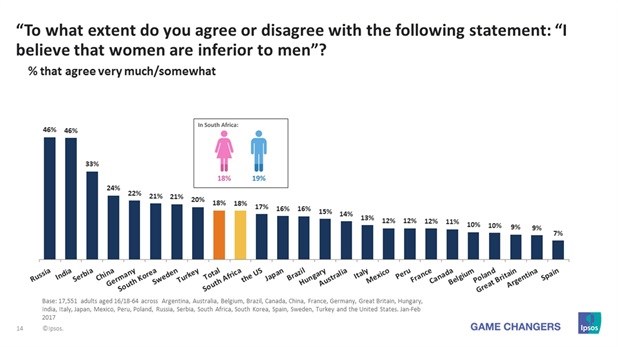
- Attitudes in Russia and India stand out - almost half of those asked in those countries believe that women are inferior to men (46% each), as do one in three (33%) in Serbia.
- A similar proportion, 25% on average, believe men are more capable of doing things in society such as working, earning money, being educated and teaching than women. Again, men are more likely to agree with this than women (by 29% to 21%), and belief is particularly high in China (56%), Russia (54%) and India (25%).
- Just over a fifth (22%) of online South Africans agree with this statement.
Standing up for equal rights
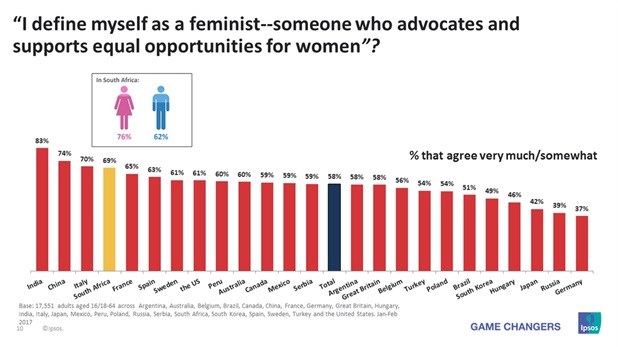
Commenting on the findings, Mari Harris, Head of Ipsos Public Affairs said:
- “Ipsos’ latest international study suggests that the principle of gender equality is making more progress around the world than the reality. It’s encouraging that the clear majority of both men and women around the world believe in equal opportunity, and that ‘feminism’ doesn’t seem to be a minority pursuit – but at the same time most still believe that true equality of rights is not here yet. There also remains a minority of both sexes who believe in male superiority – but perhaps most concerning is the one in four who are scared to speak up for equal rights, especially in some pockets of the world. When it comes to online South Africans, we tend to have more liberal views than the international average, but even so, more than seven in ten (77%)of us think women and men don’t have full equal rights at the moment.”
- Unlocking the value of creativity in advertising: How to bridge the creativity gap15 Apr 13:47
- 4 habits keeping your brand poor26 Mar 16:08
- Understanding consumer mindsets for growth in 202407 Mar 08:52
- South Africa's unemployment nightmare: The burden on its people09 May 10:05
- Global survey shows shrinking trust in internet29 Nov 10:17


















